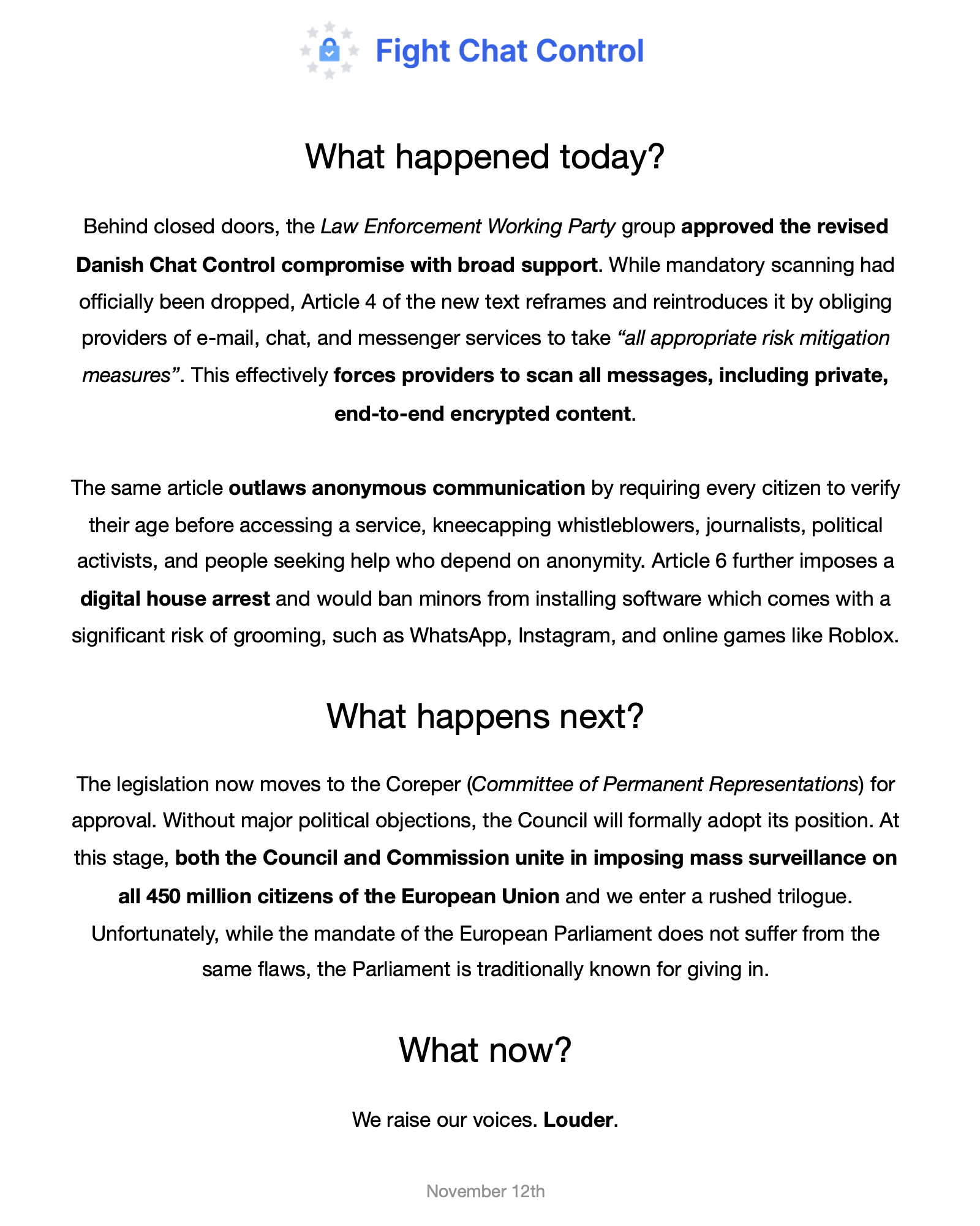🎵 Hello darkness my old friend
Here at fucking 5 PM 🎵
Was rather nice joining the FedCM TPAC call tonight, and I think I contributed some value to the call, which was even nicer.
The resistance from the indigenous brings me to tears.
Should the default #curl progress meter use 1000-based units instead of 1024-based ones ?
Microsoft announces a new marketing strategy for the Year of the Linux Desktop 😉 Thank you for doing this. 😂 Nobody asked for this kind of product that breaks all privacy and safety standards. So choose wisely
🤑 Davant la crisi immobiliària que afecta famílies i entitats, posaries doblers en una #cooperativa perquè compri pisos, locals, oficines, etc. perquè els llogui a preu assequible i no especulatiu?
A canvi, rebries un interès anual 🫰
Ens ajudes a saber si podem iniciar un projecte així a #Mallorca? Respon i fes-ho córrer!
It's becoming increasingly clear to me that Reflect Orbital's fucking stupid giant mirror satellite, with absolutely NOTHING useful to offer, which will cause countless safety issues, ecological disasters, and destroy the night sky, is going to launch.
A bunch of astronomers and I have sent out a fact sheet about them to a bunch of journalists, but very few are going to write about this. So, let me try posting it all here.
Here's what I know about Reflect Orbital and all the downsides:
Aurora for the 2nd night in a row!
Seen in southern New Mexico at 33N latitude at 7:30PM Mountain Standard time.
Not as bright as last night...so far. Will continue to monitor.
#Aurora #SpaceWeather #NewMexico #Photography #Astrophotography #Technology
After spending a month in Portland, OR I got so inspired by amazingly creative social projects that bring neighbors and local communities together that I decided to start collecting these ideas.
My wish is to document them in such a way that they can be really easily replicable in any community.
Here's the repo where I will work on it. If you have any ideas or feel like collaborating in any way, let me know :)
Otherwise just click ⭐ so others can more easily find it ❤️
https://github.com/ninabreznik/The-Commons-Library/blob/main/ABOUT.md
I've been trying to express exactly this discomfort with modern interface design and especially LLM design and this lady nailed it back in *1993*
("A Small Matter of Programming", Bonnie A. Nardi)
WE WON! After 42 days of striking we have a tentative agreement in hand that protects our existing 4 day work week, establishes a minimum salary, and adds protections against AI replacing jobs at our workplace!
We got it done. Our union's members are unstoppable. ✊
If it's dark and cloudless where you are, there's a booming aurora right now! Get away from lights and look north. Try snapping a photo with your phone even if you don't see anything.
https://www.swpc.noaa.gov/communities/space-weather-enthusiasts-dashboard
wow aurora looks wild tonight
With all the news you hear from Washington, don't forget: DC is FLOODED with protesters, thanks to the valiant organizers who've been putting themselves out there and getting people to DC for months. They're staying until the regime falls.
It is only one factor in all this but it's a big one. All these cowards in DC have no choice but to face giant, angry crowds throughout the city.
Not one iota of this crap is getting swept under the rug.
After Trump Split, Epstein Said He Could ‘Take Him Down’
https://www.nytimes.com/2025/11/12/us/epstein-emails-trump.html?utm_source=flipboard&utm_medium=activitypub
Posted into Politics @politics-newyorktimes
They tell us that dangerous people are on the loose, threatening our communities.
But if anyone is dangerous, it is those who would do harm to their neighbors in return for a bribe—those who sell their capacity to inflict violence to the highest bidder.
Crush ICE.
Should the default #curl progress meter use 1000-based units instead of 1024-based ones ?
Well, this is embarrassing. Looks like I finally cursed at Starlink enough that I managed to open up some kind of portal in VLEO right over my barn. Sorry everybody! I promise I'll help clean up.
bonfire.cafe
A space for Bonfire maintainers and contributors to communicate







